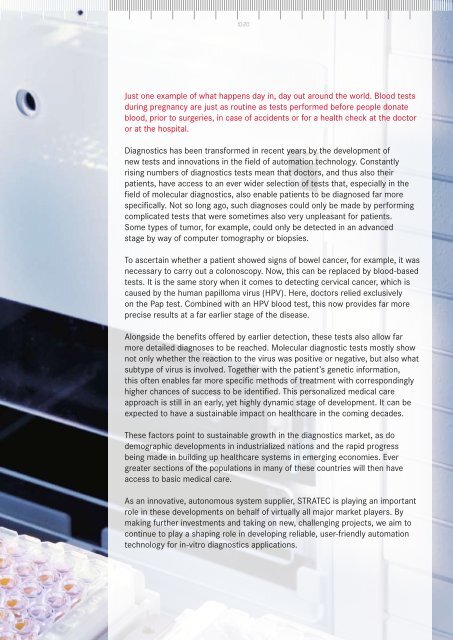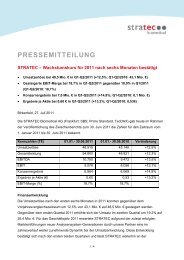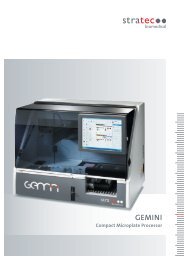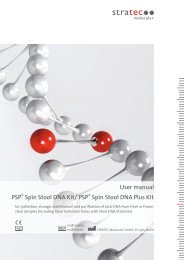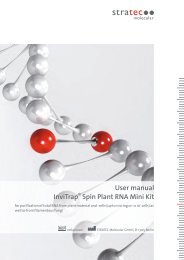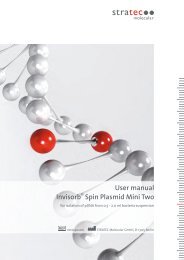annual Report 2009 - STRATEC Biomedical AG
annual Report 2009 - STRATEC Biomedical AG
annual Report 2009 - STRATEC Biomedical AG
Create successful ePaper yourself
Turn your PDF publications into a flip-book with our unique Google optimized e-Paper software.
10:08 10:20<br />
Just one example of what happens day in, day out around the world. Blood tests<br />
during pregnancy are just as routine as tests performed before people donate<br />
blood, prior to surgeries, in case of accidents or for a health check at the doctor<br />
or at the hospital.<br />
Diagnostics has been transformed in recent years by the development of<br />
new tests and innovations in the field of automation technology. Constantly<br />
rising numbers of diagnostics tests mean that doctors, and thus also their<br />
patients, have access to an ever wider selection of tests that, especially in the<br />
field of molecular diagnostics, also enable patients to be diagnosed far more<br />
specifically. Not so long ago, such diagnoses could only be made by performing<br />
complicated tests that were sometimes also very unpleasant for patients.<br />
Some types of tumor, for example, could only be detected in an advanced<br />
stage by way of computer tomography or biopsies.<br />
To ascertain whether a patient showed signs of bowel cancer, for example, it was<br />
necessary to carry out a colonoscopy. Now, this can be replaced by blood-based<br />
tests. It is the same story when it comes to detecting cervical cancer, which is<br />
caused by the human papilloma virus (HPV). Here, doctors relied exclusively<br />
on the Pap test. Combined with an HPV blood test, this now provides far more<br />
precise results at a far earlier stage of the disease.<br />
Alongside the benefits offered by earlier detection, these tests also allow far<br />
more detailed diagnoses to be reached. Molecular diagnostic tests mostly show<br />
not only whether the reaction to the virus was positive or negative, but also what<br />
subtype of virus is involved. Together with the patient’s genetic information,<br />
this often enables far more specific methods of treatment with correspondingly<br />
higher chances of success to be identified. This personalized medical care<br />
approach is still in an early, yet highly dynamic stage of development. It can be<br />
expected to have a sustainable impact on healthcare in the coming decades.<br />
These factors point to sustainable growth in the diagnostics market, as do<br />
demographic developments in industrialized nations and the rapid progress<br />
being made in building up healthcare systems in emerging economies. Ever<br />
greater sections of the populations in many of these countries will then have<br />
access to basic medical care.<br />
As an innovative, autonomous system supplier, <strong>STRATEC</strong> is playing an important<br />
role in these developments on behalf of virtually all major market players. By<br />
making further investments and taking on new, challenging projects, we aim to<br />
continue to play a shaping role in developing reliable, user-friendly automation<br />
technology for in-vitro diagnostics applications.


